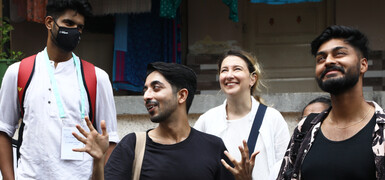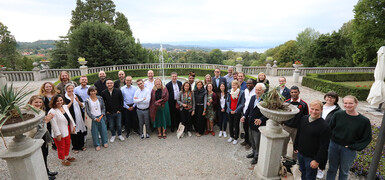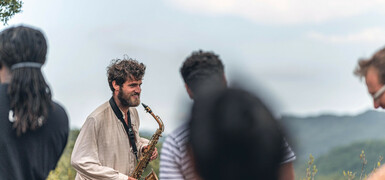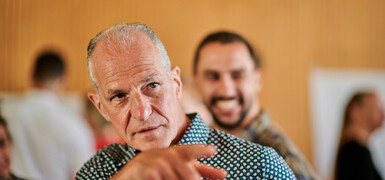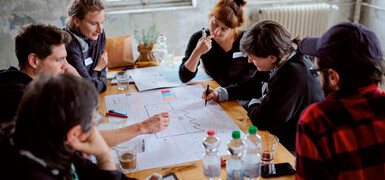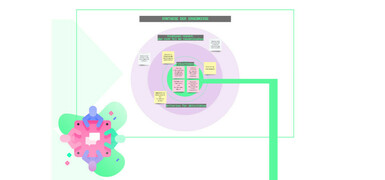
How to Support Pilots Navigating a Volatile World
The development of systemic thinking and action requires places of learning in practice and the experience of impact.
Foundations navigate a socio-economic environment marked by complexity, volatility and insecurity (Zukunft des Stiftens, Roland Berger Strategy Consultants by order of the Robert Bosch Foundation, 2014, p. 32f.). Many foundations are adapting their roles, organizational structures and funding instruments to meet the demands of a complex and volatile world. They test agile forms of work and systemic funding instruments, and also cooperate with partners from other sectors. In recent years, it has become increasingly clear that the work of foundations can be made more effective by developing and cooperating with networks.
In this light, it is no surprise that foundations are increasingly looking for employees who can demonstrably analyze complex relationships, make strategic decisions in situations which are unclear and confusing, and can successfully coordinate collaborative (network) structures.
The skills needed to manage projects in volatile environments can be best acquired and deepened in real testing and decision-making situations. This is also true for the accompanying attitude: developing an appreciation of other perspectives, curiosity about and mutual respect for people with different experiences and thus alternative perspective on things requires constant practice. A confident approach to dealing with ambiguity and uncertainty can be best developed and deepened through peer-to-peer learning.
Alumni networks as testing fields
The development of systemic thinking and action requires places of learning in practice and the experience of impact. In order to maintain their role as 'pilots' in a volatile world, foundation employees require testing grounds where they can learn to make assumptions about a confusing real world, translate these into interventions, test them in practice and learn quickly from experiences. This cyclical approach combines planning, concrete action and insights about systems with the development of management and controlling competencies in a volatile world (Action Inquiry, Torbert & Associates, 2004).
In terms of human resource/talent development, this raises the question: where and how can foundation employees learn and test methods for observation and action in complex situations? How do they learn to build and coordinate networks? Where can they trial and deepen their project management skills in an unstable and unpredictable environment? And how can they develop trust in partners from different sectors?
Our previous experience has shown that inclusive and intentional alumni networks which connect the employees of a foundation with former grant holders and partners, can serve as an optimal testing ground for systemic thinking and actions, as well as a laboratory for developing and managing competencies in network structures. They allow foundations to better fulfil their mission and implement philanthropic values and competencies in a forward-looking society.
The reverse also applies: impulses from society can also be adopted in the foundation's work through exchanges and joint learning within networks. These contribute to making the organizational borders of foundations porous – one of the basic requirements for innovative organizations. In networks, foundation employees can hone the necessary experience in moderation and management of trans-sector partnerships and learn to appreciate the potential of the perspectives of other actors. They can become qualified as system developers, network strategists and bridge builders.
Connecting networks – a European peer-learning format
Based on these insights, the Robert Bosch Stiftung founded the International Alumni Center (iac Berlin) in 2017, as a competence center for impact-oriented networks in philanthropy. One of its tasks is to further develop the Bosch Alumni Network. In this network, former and current fellows, grantees, partners and staff members of the foundation carry out self-organized activities, take part in further education and thus learn from and with each other.
Self-organization and accountability for learning are the key words here: the responsibility for content and formats remains in the hands of the network members. The alumni network has proven to be a learning field for leadership skills and a laboratory for new formats and forms of cooperation.
In addition to coordinating the Bosch Alumni Network and advising on the development of alumni networks, the iac Berlin also runs a program entitled Connecting Networks - a peer learning format in strategic network development for employees of European foundations. The program, which combines workshops and shared e-learning with individualized coachings, brings together employees from 20 foundations across Europe for a period of eight months.
What’s special about Connecting Networks, is that it interlocks external impulses, strategic planning, the testing of individual "mini-experiments" and reflection of the observations in peer-to-peer exchanges. The training provides participating foundation staff with a framework in which they can advance their skills for establishing or developing a specific network, while also testing methodological approaches such as peer-to-peer consultation or casework and expanding their competences in network management.
The adaptation of the foundations to an unstable and unpredictable world and the further honing of skills to deal with complexity can only be achieved together and in trusting cooperation. At best, the shared learning experience builds stable bridges between organizations, creates shared knowledge and a connecting attitude of curiosity, openness and trust.
The network approach presented here is not only a laboratory for the development of knowledge and leadership skills in a volatile world and thus a topic for talent development. It also offers insights into the shared responsibility of each individual foundation for the further development of the entire field. Because shared knowledge and available competences make each individual foundation more adaptable to the requirements of a dynamically changed world.
Did this trigger your interest and do you want to learn more about this line of thought? Please get in touch with:
Darius Polok
Managing Director
darius.polok@iac-berlin.org
